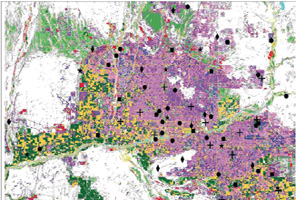April 27, 2012
Urban Heat Island Research in Phoenix, Arizona: Theoretical Contributions and Policy Applications
Authors: Winston T. L. Chow, Dean Brennan, and Anthony J. Brazel
Department of Engineering, Arizona State University, Mesa, Arizona
School of Geographical Sciences and Urban Planning, Arizona State University, Tempe, Arizona
Abstract
 Over the past 60 years, metropolitan Phoenix, Arizona, has been among the fastest-growing urban areas in the United States, and this rapid urbanization has resulted in an urban heat island (UHI) of substantial size and intensity. During this time, an uncommon amount of UHI-specific research, relative to other cities in North America, occurred within its boundaries. This review investigates the possible reasons and motivations underpinning the large body of work, as well as summarizing specific themes, approaches, and theoretical contributions arising from such study. It is argued that several factors intrinsic to Phoenix were responsible for the prodigious output: strong applied urban climate research partnerships between several agencies (such as the academy, the National Weather Service, private energy firms, and municipal governments); a high-quality, long-standing network of urban meteorological stations allowing for relatively fine spatial resolution of near-surface temperature data; and a high level of public and media interest in the UHI. Three major research themes can be discerned: 1) theoretical contributions from documenting, modeling, and analyzing the physical characteristics of the UHI; 2) interdisciplinary investigation into its biophysical and social consequences; and 3) assessment and evaluation of several UHI mitigation techniques. Also examined herein is the successful implementation of sustainable urban climate policies within the metropolitan area. The authors note the importance of understanding and applying local research results during the policy formation process.
Over the past 60 years, metropolitan Phoenix, Arizona, has been among the fastest-growing urban areas in the United States, and this rapid urbanization has resulted in an urban heat island (UHI) of substantial size and intensity. During this time, an uncommon amount of UHI-specific research, relative to other cities in North America, occurred within its boundaries. This review investigates the possible reasons and motivations underpinning the large body of work, as well as summarizing specific themes, approaches, and theoretical contributions arising from such study. It is argued that several factors intrinsic to Phoenix were responsible for the prodigious output: strong applied urban climate research partnerships between several agencies (such as the academy, the National Weather Service, private energy firms, and municipal governments); a high-quality, long-standing network of urban meteorological stations allowing for relatively fine spatial resolution of near-surface temperature data; and a high level of public and media interest in the UHI. Three major research themes can be discerned: 1) theoretical contributions from documenting, modeling, and analyzing the physical characteristics of the UHI; 2) interdisciplinary investigation into its biophysical and social consequences; and 3) assessment and evaluation of several UHI mitigation techniques. Also examined herein is the successful implementation of sustainable urban climate policies within the metropolitan area. The authors note the importance of understanding and applying local research results during the policy formation process.
Chow, Winston T. L., Dean Brennan, Anthony J. Brazel, 2012: Urban Heat Island Research in Phoenix, Arizona: Theoretical Contributions and Policy Applications. Bull. Amer. Meteor. Soc., 93, 517–530.

